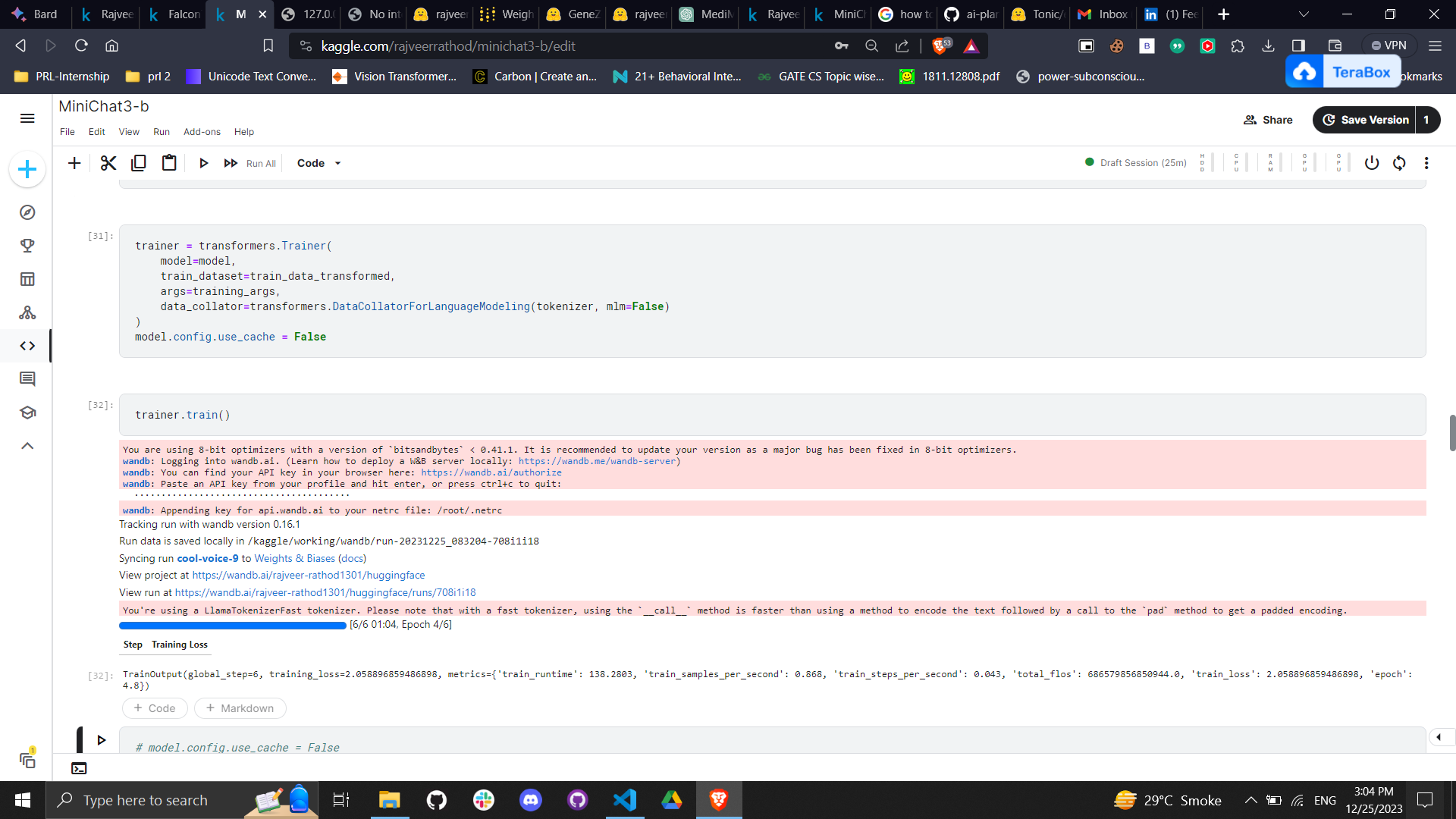ai-planet-assignment
Introduction
This repository contains code for fine-tuning a language model using the BitsAndBytes library. The goal is to generate informative responses to user queries related to marine toxins, medical queries, and other relevant topics.
Installation
To set up the environment, run the following commands in your Python environment:
pip install -Uqqq pip
pip install -qqq bitsandbytes==0.39.0
pip install -qqq torch==2.0.1
pip install -qqq -U git+https://github.com/huggingface/transformers.git@e03a9cc
pip install -qqq -U git+https://github.com/huggingface/peft.git@42a184f
pip install -qqq -U git+https://github.com/huggingface/accelerate.git@c9fbb71
pip install -qqq datasets==2.12.0
pip install -qqq loralib==0.1.1
pip install -qqq einops==0.6.1Usage
Fine-tuning the Model Clone the repository:
git clone <repository_url>
cd <repository_directory>Model Inference
To use the fine-tuned model for generating responses, you can interact with it using the provided Jupyter notebook. Simply open the notebook and follow the instructions for generating responses based on user prompts.
Model Information
The pre-trained model used for fine-tuning is "tiiuae/falcon-7b-instruct". The fine-tuned model will be saved in the "trained-model" directory.
Model Archtirecture:
PeftModelForCausalLM(
(base_model): LoraModel(
(model): LlamaForCausalLM(
(model): LlamaModel(
(embed_tokens): Embedding(49216, 3072, padding_idx=0)
(layers): ModuleList(
(0-23): 24 x LlamaDecoderLayer(
(self_attn): LlamaAttention(
(q_proj): lora.Linear4bit(
(base_layer): Linear4bit(in_features=3072, out_features=3072, bias=False)
(lora_dropout): ModuleDict(
(default): Dropout(p=0.05, inplace=False)
)
(lora_A): ModuleDict(
(default): Linear(in_features=3072, out_features=16, bias=False)
)
(lora_B): ModuleDict(
(default): Linear(in_features=16, out_features=3072, bias=False)
)
(lora_embedding_A): ParameterDict()
(lora_embedding_B): ParameterDict()
)
(k_proj): Linear4bit(in_features=3072, out_features=3072, bias=False)
(v_proj): lora.Linear4bit(
(base_layer): Linear4bit(in_features=3072, out_features=3072, bias=False)
(lora_dropout): ModuleDict(
(default): Dropout(p=0.05, inplace=False)
)
(lora_A): ModuleDict(
(default): Linear(in_features=3072, out_features=16, bias=False)
)
(lora_B): ModuleDict(
(default): Linear(in_features=16, out_features=3072, bias=False)
)
(lora_embedding_A): ParameterDict()
(lora_embedding_B): ParameterDict()
)
(o_proj): Linear4bit(in_features=3072, out_features=3072, bias=False)
(rotary_emb): LlamaRotaryEmbedding()
)
(mlp): LlamaMLP(
(gate_proj): Linear4bit(in_features=3072, out_features=8192, bias=False)
(up_proj): Linear4bit(in_features=3072, out_features=8192, bias=False)
(down_proj): Linear4bit(in_features=8192, out_features=3072, bias=False)
(act_fn): SiLU()
)
(input_layernorm): LlamaRMSNorm()
(post_attention_layernorm): LlamaRMSNorm()
)
)
(norm): LlamaRMSNorm()
)
(lm_head): Linear(in_features=3072, out_features=49216, bias=False)
)
)
)Datasets
The training data is sourced from the "keivalya/MedQuad-MedicalQnADataset". It contains medical questions paired with corresponding answers.
Training procedure
Training hyperparameters
The following hyperparameters were used during training:
- learning_rate: 0.0002
- train_batch_size: 4
- eval_batch_size: 8
- seed: 42
- gradient_accumulation_steps: 4
- total_train_batch_size: 16
- optimizer: Adam with betas=(0.9,0.999) and epsilon=1e-08
- lr_scheduler_type: cosine
- lr_scheduler_warmup_ratio: 0.05
- num_epochs: 1
Additional Information
- The
generate_prompt function creates conversation prompts in the format ": [question]\n: [answer]". - The model is fine-tuned using the
transformers library, with specific configurations forBitsAndBytesquantization andPefttraining. - The fine-tuned model can be pushed to the Hugging Face Model Hub for easy sharing and access.


